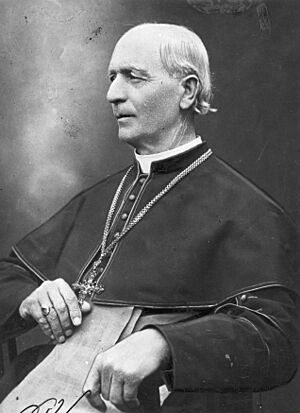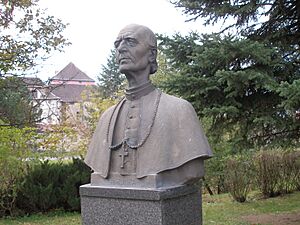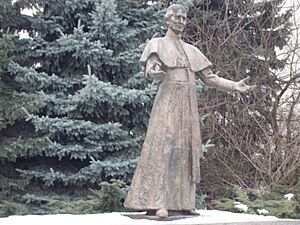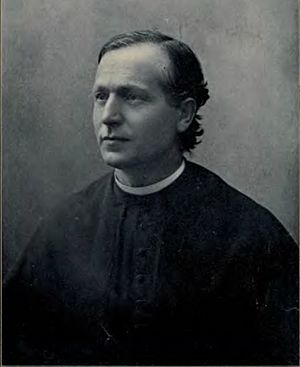Andrej Hlinka facts for kids
Quick facts for kids
Andrej Hlinka
|
|
|---|---|

Hlinka in 1937
|
|
| Born | 27 September 1864 Csernova, Rózsahegy, Kingdom of Hungary, Austrian Empire
|
| Died | 16 August 1938 (aged 73) Ružomberok, Czechoslovakia
|
| Political party | Catholic People's Party (until 1914) Slovak National Party Slovak People's Party (1914–1938) |
Andrej Hlinka (born September 27, 1864 – died August 16, 1938) was an important Slovak leader. He was a Catholic priest, a writer, a banker, and a politician. He played a big role in Czechoslovakia before World War II. Hlinka led the Hlinka's Slovak People's Party from 1913. He was also a special church official and a member of the Czechoslovak Parliament.
Contents
Early Life and Work
Andrej Hlinka was born in Černová, a village that is now part of Ružomberok. This area was then part of the Austro-Hungarian kingdom. He studied theology and became a priest in 1889.
As a priest, Hlinka worked hard to help the people in his community. He gave educational talks and organized plays. He also started credit and food banks. These banks helped ordinary people manage their money and get food.
Standing Up for Slovak Rights
Hlinka strongly believed in Catholic ethics. He wanted to protect traditional values against new ideas. These new ideas were linked to economic and political changes in the Kingdom of Hungary.
He first joined a Hungarian Catholic party. But this party did not care about Slovak needs. So, Hlinka left it and helped create the Slovak People's Party.
Hlinka became very popular because of his social work. In 1905, he was chosen as a parson in Ružomberok. This was against the wishes of his Hungarian bishop.
In 1906, he supported a Slovak candidate in elections. He also spoke up for the Slovak national movement. The church leaders did not like his actions. They suspended him from his duties as a priest.
He was later put in prison for stirring up trouble. While he was suspended, his bishop ordered a church in Černová to be blessed. This church was built with Hlinka's help. But Hungarian-speaking priests were sent to do it.
Local people protested this decision. This led to a sad event known as the Černová massacre. This event brought international attention to the struggles of the Slovak people. While in prison, Hlinka helped translate the Old Testament into the Slovak language. He later won his case against the bishop and was allowed to be a priest again.
In 1907, he started the Ľudová banka (People's Bank). He became its chairman three years later.
Leading the Slovak People's Party
In 1913, the Slovak People's Party became separate from the Slovak National Party. Hlinka became the leader of this new party. He stayed in this role for the rest of his life.
Helping Create Czechoslovakia
At the end of World War I, Hlinka played a key part in forming Czechoslovakia. In 1918, he clearly stated that Slovaks should separate from Hungary. He said, "A thousand years of marriage with the Hungarians didn't work out. We have to divorce."
He became a member of the Slovak National Council. He also signed the Martin Declaration. This document supported joining with the Czech nation. In the early days of Czechoslovakia, Hlinka strongly supported the new country.
Seeking Slovak Autonomy
Hlinka soon became unhappy with how things were going. He felt that Slovakia was not treated equally. He also disliked some actions against religion. He believed that Slovakia should have more self-rule, or autonomy. This idea was based on the Pittsburgh Agreement.
In 1918, Hlinka traveled to Paris. He wanted to tell world leaders about Slovakia's desire for autonomy. He shared a document about Slovakia with journalists. However, he was arrested and sent out of Paris. This trip was not well-planned. It could have harmed Czechoslovakia's interests.
Even though he was imprisoned, Hlinka remained popular. In 1920, he was elected to the Czechoslovak Parliament. He was then released from prison.
For nearly 20 years, he fought for Slovakia's autonomy. He also wanted the Slovak nation to be recognized as independent. He believed that too much power in the central government threatened Slovak culture. He said, "We are for the common state of Czechs and Slovaks, but we are for the application of national individuality of both constituent nations." His party quickly became the most popular in Slovakia.
Hlinka was known for his strong personality. He was charismatic, determined, and spoke his mind. This sometimes made negotiations difficult. He was also known to criticize his opponents.
Later in his life, Hlinka was more a symbol for his party. He was less involved in daily decisions. In the 1930s, his party started to lean towards more authoritarian ideas. Hlinka admired leaders who had strong, Catholic-based governments.
His party was divided into two groups. There were the "conservatives" led by Jozef Tiso. And there were the "radicals," who were younger members. Hlinka tried to keep a balance between them.
On June 5, 1938, Hlinka gave a speech in Bratislava. He again demanded autonomy for Slovakia. He signed a new proposal for autonomy. But he died before his goal was reached.
Less than two months after Hlinka's death, Slovakia gained autonomy. This happened after the Munich Agreement. Czechoslovakia was weakened at that time.
Legacy


During the first Slovak Republic (1939–1945), Hlinka was seen as a national hero. Josef Tiso, who took over Hlinka's party, became the president of this state. The Hlinka Guard, a group linked to his party, was formed shortly before he died.
During the time of Communist Czechoslovakia, Hlinka was often seen as a "clerofascist." This term linked him to a mix of religious and authoritarian ideas.
After communism ended, Hlinka became a respected figure again. Especially among those who supported Slovak nationalism and Christian democratic ideas. His picture was even on the Slovak 1000-crown banknote. This was before Slovakia started using the Euro in 2009. In 2007, there was a proposal in the Slovak Parliament to call him the "father of the nation." It almost passed.
Today, Andrej Hlinka is remembered in his hometown of Černová. His house there is open to visitors. The Mausoleum of Andrej Hlinka in Ružomberok was also recently reopened.


